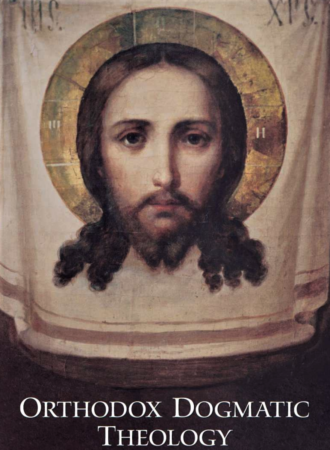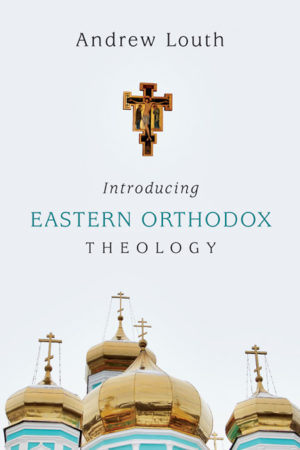Podcast: Play in new window | Download
Subscribe: Spotify | Email | RSS
 In this first part of my response to Dr. Beau Branson’s “The Neglected Monarchy of the Father and the Analytic Debate about the Trinity,” I dispute his claim that his in “the” Orthodox view of the Trinity. I discuss several recent authorities on Eastern Orthodox theology who clearly hold that the one God is the Trinity (and so, not the Father alone).
In this first part of my response to Dr. Beau Branson’s “The Neglected Monarchy of the Father and the Analytic Debate about the Trinity,” I dispute his claim that his in “the” Orthodox view of the Trinity. I discuss several recent authorities on Eastern Orthodox theology who clearly hold that the one God is the Trinity (and so, not the Father alone).
I also relate some anecdotes about my interactions with Orthodox people and Orthodoxy on the Trinity, and I discuss the Orthodox (and generally, catholic) penchant for appeals to “mystery.”
I then explain why in my view the 381 creed assumes that there is a triune God, whereas the 325 creed does not.
I also suggest that Dr. Branson and I have more in common than he realizes, despite our differences.
Links for this episode:
- Dr. Beau Branson’s homepage
- Branson Part 1, Part 2, Part 3, Part 4
- “The unfinished business of Trinitarian theorizing“
- “A Trinitarian Dilemma” (Russian version)
- “Divine deception, identity, and Social Trinitarianism“
- “Divine Deception and Monotheism“
- “On Positive Mysterianism“
- Dealing with Apparent Contradictions: Part 14 – James Anderson’s Paradox in Christian Theology
- mysterianism
- special pleading
- podcast 57 – Richard Swinburne on the Trinity
- podcast 231 – Swinburne’s Social Theory of the Trinity
- Louth, Introducing Eastern Orthodox Theology

- Pomazansky, Orthodox Dogmatic Theology
- Dr. John Behr
- Ware, The Orthodox Church
- Lossky, The Mystical Theology of the Eastern Church
- podcast 31 – Dr. William Hasker on the “Arian” Controversy
- podcast 30 – The Council of Nicea
- 10 steps towards getting less confused about the Trinity – #6 get a date – part 2
- The Orthodox Formulas 2: The Council of Constantinople (381)
- This week’s thinking music is “Mistakes were made” by _ghost.

Views of Cappadocians are critically important when we talk about Trinity. They are the ones who properly defined and distinguished between Ousia and Hypostasis; and 381 creed is highly influenced by their theology. The idea of ‘Triune God’ as the One True God is a novelty introduced by Augustine and this is confirmed even by Ayres who is a Catholic. The Tri-Hypostatic God appeared in Orthodox theology by around 10th century. Now we should not ignore the influence of Roman Catholic theology with its well-defined dogmas and catechism compared to the ‘theology transmitted through liturgy’ of Eastern churches.
We can find several reference even in Cappadocians fathers about Father Son and Holy Spirit as One God according to the One Godhead but this is basically in view of the question ‘whether Father, Son and Holy Spirit are three Gods’. Apparently for them the unity of Trinity was not just in Father as some wants to posit but was also in the common essence. Moreover, the One Godhead is not exactly the Trinity (i.e. a collection of three hypostasis) in these contexts rather it is a reference to the common essence shared by Father Son and Holy Spirit. But this is not same as the One God = Trinity of Augustine. Application of One God language with reference to One Godhead that we find in Cappadocians should be read in the context i.e. in light of the theology of their opponents. Now in the case of Augustine he was not responding to any heresy in his ‘De Trinitate’; and the liberty he took in promoting Trinity to the status of One God and his evidently conscious reluctance to apply One God language to Father probably had a great impact in later Trinitarian theology in west and east.
I’ve heard the “monarchy of the Father” argument from Orthodox theologians before, but they seem to have two definitions of “God.” On the one hand, God is the Father, the sole source of all being, including that of the Son and Spirit, so He alone is God in that sense. But because the Son and Spirit are generated by (within) the one God, the Son and Spirit are also God. So God may be defined two ways: (1) God is the Father, the source of all being. (2) God is the source of all being AND anything else that is generated within the eternal being (i.e., the Son and Spirit). I think this is essentially what this Orthodox essay is arguing:
https://afkimel.wordpress.com/2013/02/15/the-importance-of-the-monarchy-of-the-father-according-to-john-zizioulas/
Comments are closed.